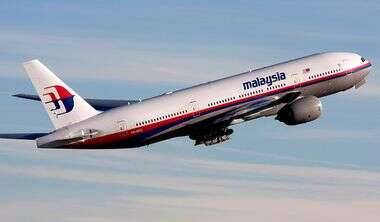RESEARCHERS have proposed a new plan to crack the Malaysia Airlines MH370 mystery and find the plane's final resting place.
After analysing over 100 hours underwater audio from historical aircraft accidents and one submarine disappearance, researchers at Cardiff University have come up with a new method to find the missing plane.


Flight MH370 disappeared on Saturday 8 March 2014 during a routine journey from Kuala Lumpur, Malaysia to Beijing, China.
Despite a vast multinational effort - the most expensive underwater search in history, the whereabouts of the aircraft and the fate of its 239 passengers and crew remains unclear.
But researchers believe audio signals captured at a hydroacoustic station off the coast of Australia could be key to locating MH370, according to findings published in Scientific Reports today.
 Cruise passengers stranded on New Year 'trip from hell' after fungus outbreak
Cruise passengers stranded on New Year 'trip from hell' after fungus outbreak
The process may also provide a blueprint for finding other ocean-based accidents and disappearances via sound.
Ocean airplane crashes create unique acoustic signatures which can travel more than 3,000km through water.
Audio from these violent impacts can be recorded by a network of 11 hydroacoustic stations worldwide that are dotted along the seabed.
“Our analysis shows clear pressure signals from previous aircraft crashes were detected on hydrophones, even at distances exceeding 3,000km," Dr Usama Kadri, a Reader at Cardiff University’s School of Mathematics, explained.
“In the case of MH370, official investigations concluded the aircraft must have crashed near the 7th arc – the point at which the last communication between the plane and INMERSAT occurred.
“The main search area at the 7th arc lies less than 2,000km away from the hydroacoustic station at Cape Leeuwin, Australia, with no impediments to filter out the signal.
"However, within the time frame and location suggested by the official search, only a single, relatively weak signal was identified."
Dr Kadri said the official search would have to be revisited to determine whether other signals from the time might be related to MH370.
If found to be related, this would significantly narrow down, almost pinpoint, the aircraft’s location.
Dr Usama Kadri, a Reader at Cardiff University’s School of Mathematics
Researchers have proposed a series of controlled underwater explosions or air gun fire along the 7th arc to see whether they can isolate a more precise location for MH370.
 We grew up devout Christians with no sex…now we're swingers in open marriage
We grew up devout Christians with no sex…now we're swingers in open marriage
“Similar exercises were performed in the search and rescue mission for the ARA San Juan, a submarine that vanished off the coast of Argentina in 2017," Dr Kadri added.
"This shows us that it is relatively straightforward and feasible and could provide a means to determine the signal’s relevance to MH370, prior to resuming with another extensive search.
“If found to be related, this would significantly narrow down, almost pinpoint, the aircraft’s location.
"On the other hand, if the signals are found to be unrelated, it would indicate a need for authorities to reassess the time frame or location established by their official search efforts to date.”
A 25,000km “priority area” identified by Australian experts as MH370’s most likely resting place was completely exhausted by searchers in May 2018.
Two months later, an official investigation report was released in Malaysia.
It concluded the plane was manually turned around in mid-air and that “unlawful interference by a third party” could not be ruled out.
Mechanical failure as a crash cause was ruled out. The report also dismissed theories that suggested the pilot brought the plane down in a suicide mission.
While several pieces of debris have been found in the decade since the plane went missing, families are no closer to knowing what happened to their loved ones.
Dr Kadri said that while the hydroacoustic findings could be promising in finding the missing plane, they hadn't enough evidence to formally reopen the search.
“Unfortunately, we’ve been unable to find a signal with the certainty needed to launch a new search for the missing aircraft," he said.
“However, if the recommendations are followed by the appropriate authorities, we can assess the relevance of the observed signals, potentially shedding light on the location of MH370.”
In the meantime, a deep sea exploration company has promised to send a state-of-the-art underwater drone to the bottom of the sea to finally solve the MH370 mystery.


































